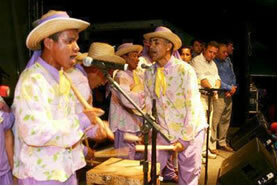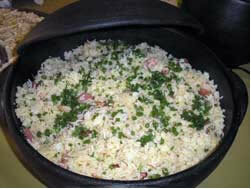The culture of the Brazilian Midwest is very diversified, as it received contributions mainly from indigenous peoples, paulistas, mineiros, gauchos, Bolivians and Paraguayans. They are typical cultural manifestations of the region: the cavalhada, in the state of Goiás; cururu, in Mato Grosso and Mato Grosso do Sul; in addition to cuisine such as rice with pequi, Paraguayan soup, rice carter, Bolivian rice, Maria Isabel, among others.
In Goiás, cultural events such as the Cavalhada and the Procession of the Fogaréu stand out.
The Cavalhadas take place in the city of Pirenópolis, it is an open-air theatrical presentation in which men on horseback represent a medieval fight between Christians and Moors. This is one of the main tourist attractions of the Festa do Divino in Pirenópolis, in Goiás.
During the Easter celebrations, the Procession of the Fogaréu takes place in the city of Goiás, on the Wednesday of Holy Week. This cultural event attracts around 10 thousand tourists.

Bonfire Procession
In many places in Brazil, the hand loom has become a museum piece. However, in some municipalities weavers are still found making various pieces of fabric, now valued by tourism.
Among the main dishes in Goiás, the chicken with pequi and guariroba, the Goiás pie and the various fruits of the cerrado stand out.
Mato Grosso presents as a cultural manifestation the cururu, a dance of probable indigenous origin, which pays homage to the patron saints of cities in the interior of Mato Grosso. The men, the only participants in the party, dance in circles to the sound of viola de concho and reco-reco.

Cururu
Other cultural events are the São Benedito festival, Siriri, Rasqueado Cuiabano, Viola-de-Cocho.
The cuisine is marked by rice cake, painted mojica, Maria Isabel and banana farofa.
Mato Grosso's handicraft is known mainly for the viola-de-cocho and embroidered nets, which are currently sold even to other countries. Cloth dolls, wooden crafts and ceramics also stand out.
Cultural manifestations in Mato Grosso do Sul have aspects similar to those in Mato Grosso. Dances such as cururu, siriri, guarânia and typical dishes stand out: Bolivian rice, caribbean, banana farofa, Paraguayan soup, rice carreteiro, meat farofa.

carter rice
The population of the Federal District comes from immigrants from several Brazilian states, this fact is largely responsible for the diversity in cuisine, accents, customs, typical foods and music. They are mainly from the Northeast, Goiás, Minas Gerais and São Paulo, with cultural characteristics of all these places.
By Wagner de Cerqueira and Francisco
Graduated in Geography
Source: Brazil School - https://brasilescola.uol.com.br/brasil/aspectos-culturais-regiao-centrooeste.htm
